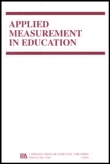
APPLIED MEASUREMENT IN EDUCATION
Scope & Guideline
Transforming education through precise measurement.
Introduction
Aims and Scopes
- Educational Measurement Techniques:
Focuses on the development, validation, and application of various measurement techniques, including Item Response Theory (IRT), Rasch models, and Bayesian statistics. - Assessment Fairness and Equity:
Explores issues related to fairness in assessments, including Differential Item Functioning (DIF), cultural relevance, and the impact of socioeconomic factors on test performance. - Innovations in Testing Methods:
Investigates new methodologies in educational assessment, such as adaptive testing, automated scoring systems, and the use of technology in testing environments. - Validity and Reliability Studies:
Emphasizes the importance of validity and reliability in test score interpretation, including empirical approaches to establishing measurement quality. - Cognitive and Affective Processes in Assessment:
Examines the cognitive and emotional factors influencing test-taking behavior and performance, addressing issues such as disengagement and motivation.
Trending and Emerging
- Culturally Responsive Assessment Practices:
An increasing focus on developing assessments that are culturally relevant and equitable, addressing the need for inclusivity in educational measurement. - Technology-Enhanced Assessment:
The rise of automated scoring systems and computer-based assessments is a significant trend, reflecting the integration of technology in educational measurement practices. - Adaptive and Personalized Testing:
Research exploring the benefits and challenges of adaptive testing methodologies is gaining traction, emphasizing the need for assessments that adapt to individual learner characteristics. - Social Justice in Assessment:
A growing emphasis on the role of assessments in promoting social justice and addressing systemic inequities in education is emerging as a key theme. - Engagement and Motivation in Testing:
There is an increasing interest in understanding how student engagement and motivation affect assessment outcomes, leading to innovative approaches to enhance test-taking experiences.
Declining or Waning
- Traditional Testing Methods:
There is a noticeable decrease in research focusing on conventional testing methods, such as paper-and-pencil tests, as interest shifts towards more innovative and technology-enhanced assessment approaches. - Generalizability Theory Applications:
Research exploring traditional applications of Generalizability Theory is becoming less frequent, possibly due to the increasing focus on more sophisticated statistical models and frameworks for understanding measurement reliability. - Static Assessment Models:
The emphasis on static models of assessment, which do not account for the dynamic nature of learning and assessment contexts, is declining in favor of more adaptive and responsive assessment strategies.
Similar Journals
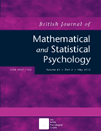
BRITISH JOURNAL OF MATHEMATICAL & STATISTICAL PSYCHOLOGY
Exploring the Intersections of Data and Human BehaviorThe British Journal of Mathematical & Statistical Psychology, published by Wiley, is a prestigious peer-reviewed journal that plays a pivotal role in advancing the interdisciplinary fields of psychology, mathematics, and statistics. With an ISSN of 0007-1102 and an E-ISSN of 2044-8317, it boasts a Category Quartile ranking of Q1 in diverse areas including Arts and Humanities, Medicine, Psychology, and Statistics and Probability as of 2023, signifying its considerable impact and relevance. This journal provides a platform for the dissemination of high-quality research and innovative methodological advancements that address complex psychological phenomena through rigorous statistical frameworks. It covers a breadth of topics from classic problems to modern data analytic techniques, appealing to researchers, professionals, and students alike. Founded in 1965, the journal continues to thrive global scholarly dialogue until 2024, fostering collaboration among disciplines and enhancing understanding of psychological data. Although it is not an open access journal, its rigorous selection process ensures that only the most significant and impactful research is published, further maintaining its esteemed position within the academic community.

International Journal of School & Educational Psychology
Unveiling New Perspectives in School and Educational PsychologyThe International Journal of School & Educational Psychology, published by Taylor & Francis Ltd, is a premier academic journal dedicated to advancing the fields of educational and developmental psychology. With an ISSN of 2168-3603 and E-ISSN 2168-3611, the journal has been a valuable resource since its establishment in 2013, with contributions to the field continuing through 2024. The journal's commitment to rigorous research is evident in its Q2 ranking in both Developmental and Educational Psychology and Education categories in 2023, as well as its notable Scopus rankings, placing it in the top 25% of educational journals. Although it does not offer open access options, the journal provides an essential platform for disseminating high-quality research that enriches the understanding of psychological principles in educational contexts. Targeting researchers, professionals, and students alike, the International Journal of School & Educational Psychology strives to highlight innovative methodologies, practical applications, and theoretical discussions that shape educational practices and foster optimal learning environments.
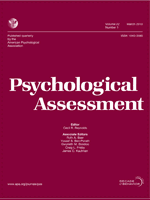
PSYCHOLOGICAL ASSESSMENT
Pioneering Innovations in Psychological MeasurementPSYCHOLOGICAL ASSESSMENT is a prestigious journal published by the American Psychological Association that has been a cornerstone in the fields of Clinical Psychology and Psychiatry and Mental Health since its inception in 1989. With an impressive impact factor, this journal is ranked in the Q1 category for both related fields, showcasing its critical role in disseminating high-quality research and scholarly articles. The journal focuses on the development, validation, and application of psychological assessment tools, inviting contributions that enhance the understanding of mental health through rigorous methodological frameworks. As evidenced by its high Scopus rankings—66th in Clinical Psychology and 165th in Psychiatry and Mental Health—PSYCHOLOGICAL ASSESSMENT is indispensable for researchers, professionals, and students who seek to advance their knowledge and practice in psychological evaluation. While it is not an open-access journal, the insights provided are vital for anyone dedicated to the nuanced study of psychological assessment and diagnosis. For more information, visit the journal's page on the American Psychological Association's website.
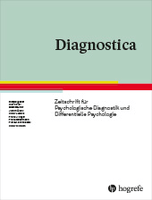
DIAGNOSTICA
Advancing insights in clinical psychology.DIAGNOSTICA is a prominent international journal published by Hogrefe Verlag, focusing on Clinical Psychology. With its ISSN 0012-1924 and E-ISSN 2190-622X, DIAGNOSTICA has carved a niche for itself within the academic community, particularly in clinical psychological research and practice. The journal has been a vital platform for sharing innovative research findings since its inception in 1996 and continues to contribute to the field with its convergence running through to 2024. Despite being categorized as Q3 in the 2023 Clinical Psychology ranking, it serves an important role in disseminating valuable insights and encourages discourse among professionals and scholars. Researchers, practitioners, and students can benefit from its rich repository of studies encompassing various aspects of psychological assessment, diagnosis, and treatment methodologies. Located in Göttingen, Germany, DIAGNOSTICA remains dedicated to advancing the understanding of psychological well-being, thus reinforcing its significance in clinical practice and mental health research.
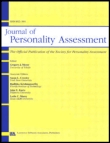
JOURNAL OF PERSONALITY ASSESSMENT
Exploring the Nuances of Personality MeasurementJOURNAL OF PERSONALITY ASSESSMENT is a leading scholarly publication dedicated to advancing the field of personality evaluation and psychological assessment. Published by Routledge Journals, Taylor & Francis Ltd, this prestigious journal has been serving the academic community since 1971, consistently pushing the boundaries of research through rigorous peer-reviewed articles. With an impressive Q1 categorization across multiple disciplines, including Clinical Psychology, Psychiatry and Mental Health, and Health, Toxicology and Mutagenesis, it ranks among the top journals in its field, reflecting a Scopus Rank of #41/311 in Clinical Psychology and #106/567 in Psychiatry. The year 2024 marks a continued commitment to excellence in psychological assessment, making this journal an essential resource for researchers, practitioners, and students who strive to understand and improve personality assessment methodologies. Although not an open-access journal, the insightful articles and findings published within serve as vital tools for navigating the complexities of human behavior and mental health.
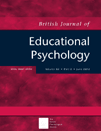
BRITISH JOURNAL OF EDUCATIONAL PSYCHOLOGY
Pioneering research for effective learning.The British Journal of Educational Psychology (BJEP), published by Wiley, stands as a leading platform in the fields of Developmental and Educational Psychology and Education. Since its inception in 1931, BJEP has consistently delivered high-quality, peer-reviewed research that addresses critical issues and advances knowledge within the educational sphere. With a commendable impact factor and a prominent Q1 ranking in both the Developmental and Educational Psychology categories, the journal boasts an impressive standing among its peers, reflected by its rankings in Scopus (Rank #101 out of 1543 in Social Sciences – Education and Rank #35 out of 360 in Developmental Psychology). Researchers, educators, and students alike will find valuable insights and innovative practices that shape learning and teaching in diverse contexts. Although currently not available as open access, the journal remains dedicated to disseminating pivotal findings that contribute to effective educational psychology practices worldwide. Explore the rich tapestry of knowledge that BJEP offers, crafted from contributions across the globe at the forefront of educational research.
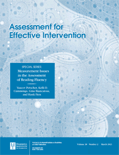
ASSESSMENT FOR EFFECTIVE INTERVENTION
Empowering effective strategies through rigorous evaluation.ASSESSMENT FOR EFFECTIVE INTERVENTION, published by SAGE Publications Inc, serves as a pivotal journal in the realms of Developmental and Educational Psychology, Education, and Health Professions. With its ISSN 1534-5084 and E-ISSN 1938-7458, the journal contributes significantly to advancing knowledge and practice in these interdisciplinary areas by providing a platform for rigorous evaluation and insightful research. Recognized for its quality with a Q3 quartile ranking in Developmental and Educational Psychology and a Q2 ranking in both Education and Health Professions, ASSESSMENT FOR EFFECTIVE INTERVENTION is a respected source among its peers, ranking 507 out of 1543 in the Social Sciences Education category according to Scopus. Researchers, practitioners, and students alike can benefit from the journal's comprehensive articles, which aim to enhance intervention strategies and foster effective assessment practices. Although the journal does not currently offer open access, its enduring legacy since 1988 ensures a wealth of knowledge spanning over three decades, making it an essential read for anyone invested in improving educational and psychological outcomes.
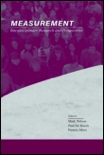
Measurement-Interdisciplinary Research and Perspectives
Advancing Measurement Across DisciplinesMeasurement-Interdisciplinary Research and Perspectives (ISSN: 1536-6367, E-ISSN: 1536-6359), published by Routledge Journals, Taylor & Francis Ltd, serves as a pivotal platform for the dissemination of innovative research across the disciplines of applied mathematics, education, and statistics. With an impressive convergence of research since its establishment in 2010, this journal not only displays a commendable impact factor but also maintains a Q3 ranking in three critical categories for 2023, highlighting its influence within the academic community. Located in the United Kingdom, the journal is dedicated to fostering interdisciplinary approaches that enhance measurement practices and contribute to educational advancements. Despite its current status not being open access, it remains accessible through various academic databases, making it a valuable resource for researchers, professionals, and students alike who seek to engage with cutting-edge methodologies and findings in measurement sciences.
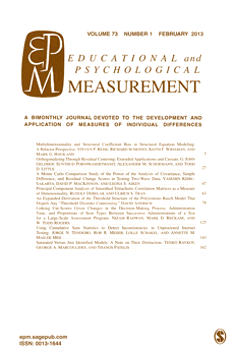
EDUCATIONAL AND PSYCHOLOGICAL MEASUREMENT
Connecting Theory and Practice in MeasurementEDUCATIONAL AND PSYCHOLOGICAL MEASUREMENT, published by SAGE Publications Inc, is a premier journal serving as a vital resource for researchers and practitioners in the fields of educational and psychological assessment. With a rich history dating back to 1941, this esteemed journal encompasses a wide-ranging scope, exploring the intricacies of measurement techniques and their implications within applied mathematics, psychology, and education. Notably categorized in Q1 quartiles across various fields, including Applied Mathematics and Educational Psychology, the journal ranks impressively in Scopus, reflecting its high impact and relevance—ranked #82/635 in Applied Mathematics and #232/1543 in Education. The journal’s commitment to advancing knowledge in educational measurement equips scholars with essential insights and methodologies, making it an essential tool for advancing scholarly inquiry and practice. With no open access limitations, EDUCATIONAL AND PSYCHOLOGICAL MEASUREMENT is dedicated to disseminating quality research that influences educational practices and psychological evaluation, thus reinforcing its esteemed position within academia.
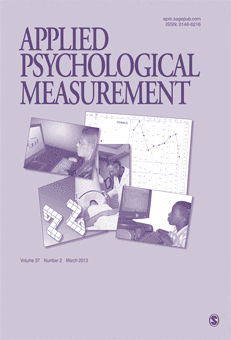
APPLIED PSYCHOLOGICAL MEASUREMENT
Pioneering Insights in Psychological MeasurementApplied Psychological Measurement is a leading journal in the field of psychology and social sciences, published by SAGE Publications Inc. since its inception in 1977. With an impressive 2023 impact factor and consistently ranking in the Q1 quartile for both Psychology and Social Sciences categories, this journal plays a pivotal role in disseminating high-quality research that advances the understanding of psychological assessment and measurement methodologies. The journal embraces a diverse array of research contributions, ranging from empirical studies to theoretical discussions, covering critical topics that affect practitioners and researchers alike. With its comprehensive scope and rigorous peer-review process, Applied Psychological Measurement serves as an essential resource for researchers, professionals, and students aiming to deepen their knowledge and application of psychological measurement within various social contexts. The journal is based in the United States, ensuring a prominent platform for international discourse.